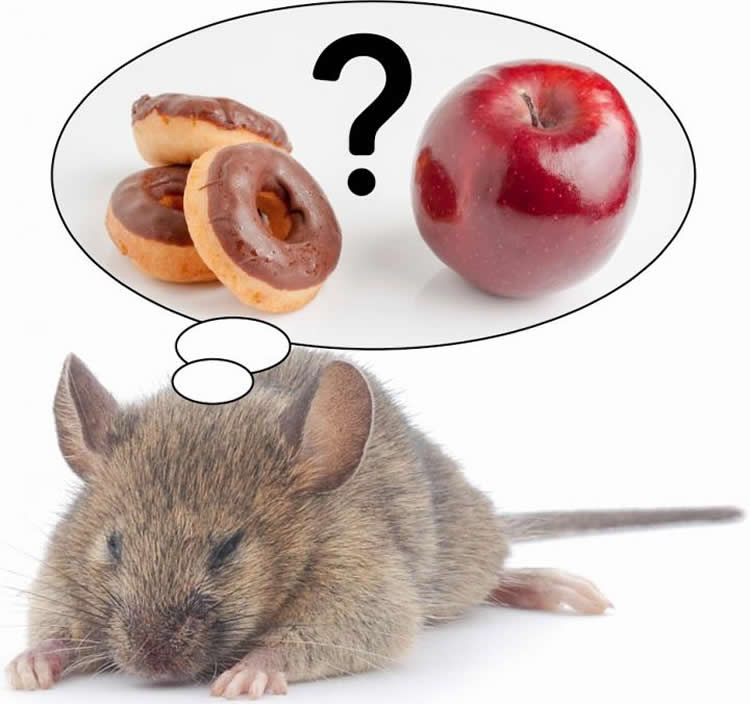Summary: A lack of REM sleep may lead to an increased desire to consume unhealthy foods, a new study reports.
Source: University of Tsukuba.
It is not well understood what role sleep loss plays in affecting areas of the brain that control the desire to consume unhealthy foods. A new paper published on December 6 in the journal eLife finds that rapid eye movement (REM) sleep loss leads to increased consumption of unhealthy foods, specifically sucrose and fat.
The researchers at the University of Tsukuba’s International Institute for Integrative Sleep Medicine (IIIS) used a new method to produce REM sleep loss in mice along with a chemical-genetic technique to block prefrontal cortex neurons and the behaviors they mediate. As a result, the IIIS researchers discovered that inhibiting these neurons reversed the effect of REM sleep loss on sucrose consumption while having no effect on fat consumption.
REM sleep is a unique phase of sleep in mammals that is closely associated with dreaming and characterized by random eye movement and almost complete paralysis of the body.
The prefrontal cortex plays a role in judging the palatability of foods through taste, smell and texture. Moreover, persons who are obese tend to have increased activity in the prefrontal cortex when exposed to high calorie foods.

“Our results suggest that the medial prefrontal cortex may play a direct role in controlling our desire to consume weight promoting foods, high in sucrose content, when we are lacking sleep,” says Kristopher McEown, the lead author on this project.
IIIS was launched by the Ministry of Education, Culture, Sports, Science and Technology of Japan with the aim of building globally visible research centers. At IIIS gather globally prominent scientists from multiple research fields contributing to elucidate the fundamental principles of sleep/wake regulation, and develop new strategies to assess and treat sleep diseases as well as the closely associated metabolic and mental disorders.
Funding: The research was funded by the Japan Society for the Promotion of Science.
Source: Masataka Sasabe – University of Tsukuba
Image Source: NeuroscienceNews.com image is credited to University of Tsukuba.
Original Research: Full open access research for “Chemogenetic inhibition of the medial prefrontal cortex reverses the effects of REM sleep loss on sucrose consumption” by Kristopher McEown, Yohko Takata, Yoan Cherasse, Nanae Nagata, Kosuke Aritake, and Michael Lazarus in eLife. Published online December 6 2016 doi:10.7554/eLife.20269
[cbtabs][cbtab title=”MLA”]University of Tsukuba. “Loss of REM Sleep Linked to Desire For Fatty and Sugary Foods.” NeuroscienceNews. NeuroscienceNews, 6 December 2016.
<https://neurosciencenews.com/sleep-loss-fatty-food-5693/>.[/cbtab][cbtab title=”APA”]University of Tsukuba. (2016, December 6). Loss of REM Sleep Linked to Desire For Fatty and Sugary Foods. NeuroscienceNews. Retrieved December 6, 2016 from https://neurosciencenews.com/sleep-loss-fatty-food-5693/[/cbtab][cbtab title=”Chicago”]University of Tsukuba. “Loss of REM Sleep Linked to Desire For Fatty and Sugary Foods.” https://neurosciencenews.com/sleep-loss-fatty-food-5693/ (accessed December 6, 2016).[/cbtab][/cbtabs]
Abstract
Chemogenetic inhibition of the medial prefrontal cortex reverses the effects of REM sleep loss on sucrose consumption
Rapid eye movement (REM) sleep loss is associated with increased consumption of weight-promoting foods. The prefrontal cortex (PFC) is thought to mediate reward anticipation. However, the precise role of the PFC in mediating reward responses to highly palatable foods (HPF) after REM sleep deprivation is unclear. We selectively reduced REM sleep in mice over a 25–48 hr period and chemogenetically inhibited the medial PFC (mPFC) by using an altered glutamate-gated and ivermectin-gated chloride channel that facilitated neuronal inhibition through hyperpolarizing infected neurons. HPF consumption was measured while the mPFC was inactivated and REM sleep loss was induced. We found that REM sleep loss increased HPF consumption compared to control animals. However, mPFC inactivation reversed the effect of REM sleep loss on sucrose consumption without affecting fat consumption. Our findings provide, for the first time, a causal link between REM sleep, mPFC function and HPF consumption.
“Chemogenetic inhibition of the medial prefrontal cortex reverses the effects of REM sleep loss on sucrose consumption” by Kristopher McEown, Yohko Takata, Yoan Cherasse, Nanae Nagata, Kosuke Aritake, and Michael Lazarus in eLife. Published online December 6 2016 doi:10.7554/eLife.20269







